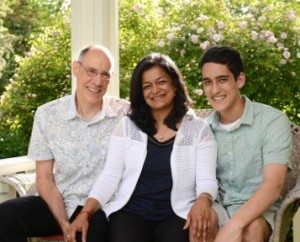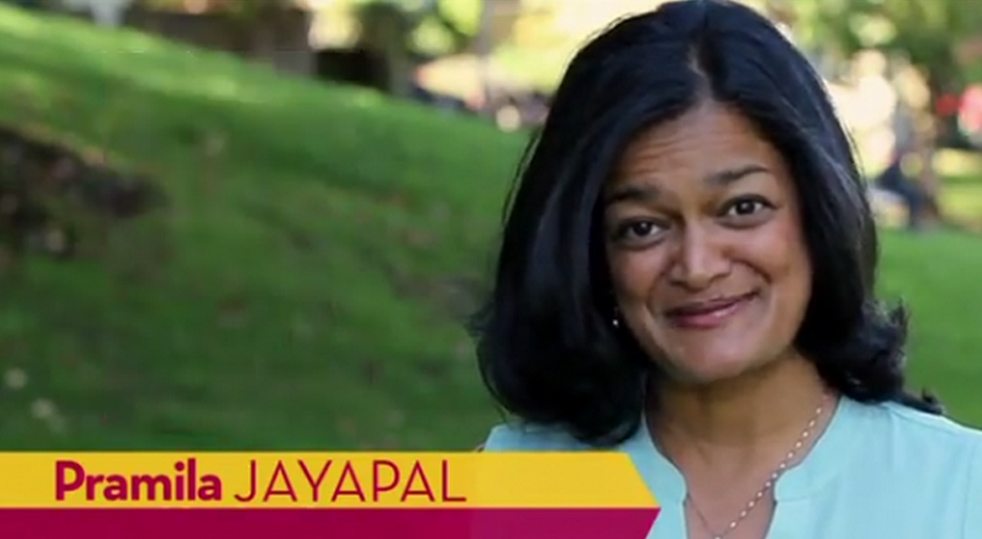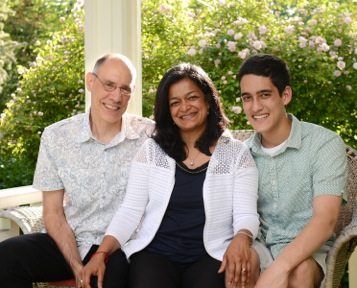Interview with the newly minted Washington State Senator.
By Rehnuma Majid
WASHINGTON, DC: Pramila Jayapal, a well-known proponent for immigration reform and human rights, won the Democratic seat for State Senate in District 37 of Washington State.

The community leader, wife, and mother to a 17-year-old, hails from India, where she was born and raised. At the age of 16, she came alone to the US and worked her way towards earning a BA and an MBA from prestigious universities.
Crediting her parents to her work ethic, Jayapal has never stopped making the best of the opportunities originally given by them, which consequentially has lead her towards a career-path of civil service, with an emphasis on the disadvantaged immigrant community.
Despite her busy schedule, she took some out for an interview with The American Bazaar. Excerpts from the interview:
Tell us a little about yourself. How did you become involved with politics? Was running for the state senate something you had aspired to for a long time?
I am an immigrant from India. I came to the United States when I was 16 years old by myself—my parents used their savings to send me here because they thought this was the place I would have the best education. It was a huge sacrifice and I have worked to make that sacrifice worthwhile. I have a BA in English Literature from Georgetown University and an MBA from The Kellogg School of Management at Northwestern University. I worked in the private sector in investment banking and with a medical equipment company before decided to devote my life to social justice. I worked in international public health across the world, running a revolving loan fund that made loans to socially responsible health projects, and then later lived for two years in India, on a fellowship writing about development, change, social issues.
In the weeks after 9/11, I founded the organization first called Hate Free Zone (later we changed the name to OneAmerica) and grew it to be the largest immigrant advocacy organization in the state. I founded the organization to fight against the discrimination and backlash against Arabs, Muslims and South Asians immediately after 9/11. We quickly started doing broader immigrant rights work as well as civil liberties work, including advocating for federal immigration reform, immigrant integration and organizing immigrants from all over the state to participate in democracy and speak out for themselves.
I had never been involved in politics before starting Hate Free Zone/OneAmerica and our first real engagement with government was actually fighting against it for abuses of civil liberties and civil rights perpetrated by the government against certain communities.
I had considered running for office from time to time but discarded it fairly quickly. I really felt that I could get more done working on the outside. I also didn’t want to give up being an organizer and an advocate! But in March of this year, something suddenly clicked in my brain and I realized that I had spent 20 years of my life trying to get elected officials and policy makers to do the things that we thought were best for our communities, and trying to organize people to believe they could make a difference. It suddenly hit me that being an elected official myself, I could continue to do both of those things, and organize from both the inside and the outside.
Running for the state senate was not something I had planned at all. In fact, I started thinking seriously about it on my son’s birthday on February 27, and I declared my candidacy on March 10! However, in running the campaign, I drew on my long relationships and collaborations I had built over the last 20 years; my deep experience of advocacy on numerous issues from police accountability to education to immigration; and my conviction that the best policy is made when communities organize and speak up and when we have courageous elected leaders who put themselves forward. In many ways, running for office felt like a very natural continuation of the work I’ve been doing for two decades.
Could you highlight some of the things you promised to work on in your campaign?
The specific issues I heard about as our campaign knocked on almost 25,000 doors were: fully funding the whole continuum of education, from early learning to higher education; preserving our safety net services, including food assistance and mental health; ensuring the we break the school to prison pipeline and find alternatives to incarceration; and continuing to stand for women’s rights and immigrant rights. To do all of this, the legislature and the people of Washington must have an honest conversation about revenue and our broken tax system. We have one of the most regressive tax systems in the country because we only have a sales tax and no corporate or personal income tax. And that sales tax base is shrinking because we only tax goods not services and we do not capture any of the economic growth that the state does see, as people’s incomes go up and businesses continue to grow. I believe we need to come together and find a way forward to bring in new revenue so that we can invest in the things that we ALL want: good schools, safe communities, good roads, good jobs and opportunity for everyone. That’s what I intend to work for in the State Senate.

Why do these issues matter?
I believe in the promise and diversity of America. The 37th district is the most economically and racially diverse district in the state, and has one of the most diverse zip codes in the country. Yet in spite of our diversity, we all know we want the same things. But too many families are falling behind. The income inequality gap has increased dramatically. The opportunity gap is enormous as more and more low-income kids and kids of color simply don’t get the tools they need to succeed in school. Families who used to be able to afford homes in the district have been pushed out. As a state, we are 41st in terms of the money we spend per student on education and our State Supreme Court has held the legislature in contempt for meeting our Constitutional mandate of fully funding our schools. We’ve taken opportunity away from a whole generation of young people as we’ve reduced dramatically the amount of tuition the state pays for a 2-year or 4-year college. I Washington state can do better than this. This isn’t about partisan politics—this is about hope and opportunity. We have to restore that for everything.
Do you have a rough timeframe in which you wish to achieve these goals?
This is a marathon not a sprint! People say that reforming the system in this state is the third rail of politics. I know it’s not going to be easy nor is it going to happen immediately. But we need to come together, start having an honest conversation about where the money must come from so that we can invest in our communities and families and businesses. We must go back to the State Supreme Court with a real plan to fully fund education and we cannot do it by cutting more from an already bare-bones budget. So some of these things will have to happen this year, but others will take longer. We need to keep our eyes on the prize, work together, put aside partisan politics and think about the kind of future we want to leave for our kids and grandkids.



